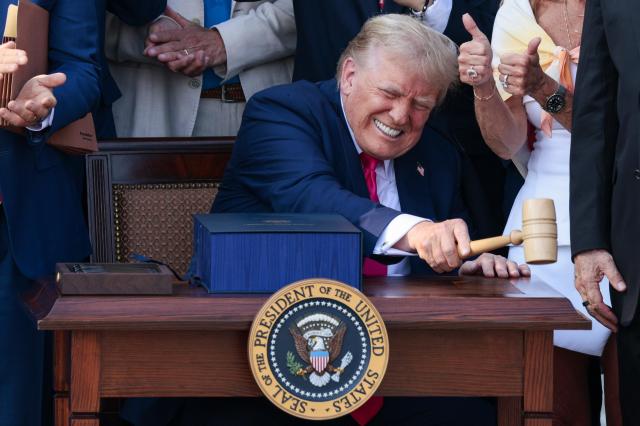Key Takeaways
- President Trump signed the “One Big Beautiful Bill for America” (OBBBA) on July 4, aiming to boost domestic industries.
- The bill raises investment tax credits for semiconductor manufacturing to 35%, benefiting South Korean firms like Samsung and SK Hynix.
- Clean energy and healthcare sectors face setbacks as the OBBBA significantly cuts tax credits and support mechanisms.
Economic Impact of the OBBBA
U.S. President Donald Trump has enacted a broad economic measure called the “One Big Beautiful Bill for America” (OBBBA) during the Independence Day Military Family Picnic at the White House. This legislation aims to bolster key components of Trump’s domestic agenda and provide significant benefits to South Korea’s semiconductor and shipbuilding industries.
The OBBBA introduces various measures intended to reduce taxes, reform welfare, strengthen national defense, and streamline government regulations. A major focus of the bill is on the semiconductor sector, with an extension of investment incentives linked to the CHIPS and Science Act of 2022. The investment tax credit for companies building semiconductor manufacturing facilities in the U.S. will increase from 25% to 35%. Analysts anticipate that this initiative may accelerate investment timelines for South Korean firms such as Samsung Electronics and SK Hynix, which have heavily invested in U.S.-based production facilities and research and development. One industry analyst noted that, “The increased investment tax credits could prompt earlier groundbreaking of new fabs and research centers.”
In addition to semiconductors, the legislation allocates $32.7 billion for the U.S. Department of Defense to invigorate the domestic shipbuilding industry. This is seen as part of a broader U.S. strategy to strengthen military supply chains and enhance readiness. South Korean shipbuilders, including Hanwha Ocean and HD Hyundai Heavy Industries, are positioned to benefit from this investment, with potential contracts in U.S. commercial and naval ship markets on the horizon.
However, the OBBBA isn’t without its downsides. The clean energy and healthcare sectors, which were significantly supported by the Biden-era Inflation Reduction Act, will face considerable challenges. The new bill implements steep cuts to tax credits for renewable energy investments and electric vehicle purchases, with key tax incentives set to expire earlier than anticipated. Specifically, tax credits for electric vehicle purchases, which were expected to be available through 2032, will now end on September 30 this year. Moreover, tax incentives for solar and wind initiatives will begin to phase out in 2026, culminating in entirely eliminated support by 2028.
Analysts have expressed concerns that the changes could dampen investment sentiment in clean energy, batteries, and electric vehicles, with one commenting that the OBBBA “effectively halts meaningful federal support.” While this new legislation represents a significant shift toward prioritizing strategic manufacturing and defense over decarbonization and healthcare expansion, its long-term implications remain to be seen.
The content above is a summary. For more details, see the source article.















